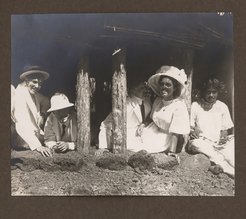German identity, intermarriage, and divorce in Samoa: 1900–1914
Forschungsprojekt

Germany’s colonial past has become an increasingly discussed topic in many forums—the questions of reparations and ownership of cultural property acquired during colonial rule requires detailed analyses—especially legal analyses that include a picture that is as comprehensive as possible of the situations at the time, the legal frameworks in place, and—most importantly—the effects. That the fourteen years of German colonial administration and the years of European involvement prior effected cultural and societal changes in Samoa is undeniable. In my research, I show how local knowledge and contemporary ideas of what it meant to be German shaped the laws the German colonial administration in Samoa imposed on people living there in the most private and personal area of law—family law.
German Identity, Intermarriage, and Divorce in Samoa: 1900 – 1914 explores the German administration’s regulation of marriages and adjudication in matters of family law such as divorce and maintenance in its efforts to control Samoans and maintain a colonial hegemony. For the first time, individual divorces have been analyzed in detail, and are done so with an eye toward the surrounding culture, circumstances, and customary law. Unlike in other German protectorates or colonies, such as German Southwest Africa and New Guinea, where marriages between native peoples and Europeans was forbidden early, the situation in Samoa was different because of cultural and racial perceptions popular in Germany at the time. The colonial legislation affecting and involving interethnic couples in Samoa, the policies, and most especially the actual practice of legal process serves as a benchmark to reflect German identity at that time. The analysis of the existing customary law and marriage practices in Samoa at that time contextualize how the legislation, by preserving colonial hegemony, reflected the cultural identity of the colonizers by contrast.
Interethnic families were already well established and integrated into Samoan society when the imperial flag was raised in Apia in 1900. The German administration sought to categorize residents into two personal jurisdictions: “foreigner” and “native”, yet those with multiple ethnicities did not always clearly fall into a particular category. To complicate matters further, the unified German civil code (Bürgerliches Gesetzbuch, or BGB) was new and its application in such situations unprecedented. When applied to legal marriages of Germans to foreigners, the BGB granted German citizenship to wives of German husbands. However, in Samoa, many existing marriages of influential residents had not been registered as civil marriages. The administration’s attempt to tackle this “problem” was the creation of a list of so-called “half-castes” (Mischlingsliste) born to parents without a recognized civil marriage to assume the jurisdiction of “foreigner”. At the same time, internally, the administration and colonial office planned to ban interethnic marriages and thus effectively put an expiry on “half-castes” who could legally be “foreigners”; the ban finally came to fruition in 1912. All of this, combined with the application of fault-based divorce in a culture where it had not before been necessary to incriminate one’s spouse was disruptive and an invasion into the personal lives of the parties.
From exoticism and racial Darwinism to the heated parliamentary debate over “mixed marriages”, German Identity, Intermarriage, and Divorce in Samoa shows the significant impact of German law on families in Samoa over the fourteen years of German government, and how attempts to categorize and judge individuals mirrored emerging and evolving definitions of German identity within the empire.
